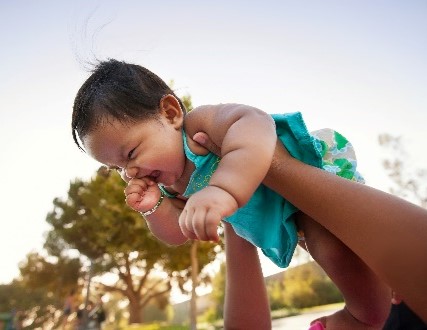Find our Healthy Start Fact Sheet (PDF) for an overview of this work.

Access key document
A healthy start for every baby begins with a healthy mother. The Healthy Start program works to improve health outcomes before, during, and after pregnancy.
What we aim to do

Enhance mothers' health
Improve the well-being of mothers who are expecting or have just given birth and their partners.

Prevent infant death
Invest in communities with infant death rates that are 1.5x the U.S. national average or greater.
How we help women and their families
Local Healthy Start projects enroll women, their partners, infants, and children (up to 18 months). At the heart of the program lies a commitment to comprehensive care tailored to each person's unique needs.
Healthy Start projects treat their clients as individuals. A staff member interviews each new client to assess their health and social needs. Then the individual is matched with a care coordinator.
Access the 2025 Fact Sheet: Healthy Start (PDF - 876 KB) to get a quick overview of the program. Read about how fathers can play a significant role in positively impacting maternal and child health before, during, and after pregnancy.
Value of a care coordinator
The care coordinator plays a critical role in guiding and supporting the participant. The care coordinator spends time with the client to understand their needs and will develop a personalized plan that can include:
Clinical care and services: providing pregnancy and postnatal care, and doula services.
Mental health and substance use screening: addressing mental health and substance use concerns, providing referrals, and connecting people to services.
Health and wellness goals: helping participants in setting and achieving health and wellness objectives.
Education: providing classes on a variety of topics like pregnancy and infant care, parenting, fatherhood, and nutrition.
Immunizations: education about preventing disease and connecting participants to vaccine services.
Intimate partner violence screening: addressing relationship violence to ensure the safety and well-being of families.
Service linkage: helping participants access other services such as transportation and housing.
The value of partnership: strengthening communities
Every Healthy Start program has a Community Consortium. This is a group of people invested in achieving a shared goal: creating an environment that supports maternal, infant, and family health and well-being.
Members include participants in the program, community residents, faith-based leaders, Title V contributors, medical and social service providers, and public health professionals. The consortium members can influence policies and practices that lead to systemic improvements in their communities.
By fostering partnerships with people in the community, Healthy Start projects use the community voices to drive improved birth and family health outcomes.
By partnering, projects can:
- Address gaps in service
- Create services that consider different cultures and languages
- Increase awareness of infant health issues
- Focus on other factors that affect health like steady income, transportation, education, and housing
Who else do awardees work with?
- National Healthy Start Association
- The Maternal, Infant, and Early Childhood Home Visiting Program
- Special Supplemental Nutrition Program for Women, Infants, and Children (WIC)
- Early Head Start
- Medicaid
- Children’s Health Insurance Program (CHIP)
- Local health centers that provide maternity care
These collaborations create a network that enhances health care access and quality for mothers and their babies.
How is Healthy Start different from the Home Visiting Program?
The Healthy Start and the Maternal, Infant, and Early Childhood Home Visiting Program (known as Home Visiting) both reach pregnant women and families. But, they differ in terms of both funding and approach.
Healthy Start provides direct funding to local entities. Healthy Start awardees serve communities in which babies die more often than the national average. Healthy Start awardees are in 36 states, the District of Columbia, and Puerto Rico.
The Home Visiting program awards grants to states, territories and jurisdictions to create state-wide networks that support and carry out HHS-approved evidence-based home visiting models.
While both programs play a vital role in improving maternal and child health, they do so in distinct ways:
The Healthy Start Program:
- Focuses on reducing infant deaths
- Provides flexibility to tailor services to meet specific family and community needs, such as
- Providing both clinical and non-clinical health services
- Offering well-woman, maternity care, and doula services
- Helping with transportation and housing needs
The Home Visiting Program:
- Focuses on early childhood development, especially:
- Preventing child abuse and neglect
- Promoting positive parenting
- Supporting school readiness
- States choose evidence-based models that fit their community’s needs
And, each program emphasizes different parts of the life course:
- The Healthy Start Program focuses on the period before, during, and after pregnancy.
- While some Home Visiting models focus on the time before birth, many models serve families throughout the early childhood period up until kindergarten.
How we gather data and track progress
We work with our awardees to collect data. That includes data related to the project and anyone who participates. This helps us monitor and evaluate activities.
How can I access the data?
We use the Healthy Start Monitoring and Evaluation Data System. Read the evaluation reports:
- Analysis of the Healthy Start Program of the Maternal and Child Health Bureau, Health Resources and Services Administration (February 20, 2020) (PDF - 269 KB)
- Summary of Findings from the 2017 National Healthy Start Evaluation (October 2020) (PDF - 269 KB)
Where awardees can go for data and training
Training: Healthy Start EPIC Center
Data: CAREWare for Healthy Start database
Get details about recent awards
- 2024 Healthy Start Grant Awards
- 2023 Healthy Start Grant Awards
- 2022 Healthy Start Grant Awards for Community-based Doulas
- 2021 Healthy Start Grant Awards for Community-based Doulas
- 2020 Healthy Start Grant Awards to 101 projects
- 2019 Healthy Start Grant Awards (list of recipients and project areas)